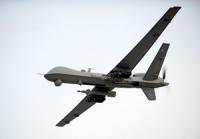-
What is Vladimir Putin really up to? Carnegie scholars aim to find out
The Trump administration’s national security team – of not the president himself – is increasingly concerned that Russia is expanding its influence around the world at a time when the United States and leading Western powers in Europe are focused on their own domestic problems. The Carnegie Endowment for International Peace is about to launch a two-year project, called “The Return of Global Russia: A Reassessment of the Kremlin’s International Agenda,” aiming to examine and analyze Russia’s activist foreign and military policies. According to Carnegie researchers, Moscow is trying to systematically undermine democracies such as the United States and alliances like the European Union and the North Atlantic Treaty Organization.
-
-
“Hacking for Defense” class an example of Stanford’s relationship with the U.S. military
Alongside all the tech companies and consulting firms present at career fairs, Stanford students looking for employment are likely to encounter another major industry when talking to recruiters: the defense sector. Although anti-war activism in the Vietnam era severed many of the university’s ties with the U.S. military, the relationship between the two has seen a revival over the years, and national security and defense institutions are more visible on campus now than they were just a decade ago. A relatively new class, MS&E 297, adds yet another wrinkle to that ongoing narrative – and one that not everyone is happy about.
-
-
Violence a matter of scale, not quantity
Anthropologists have debated for decades whether humans living in tribal communities thousands of years ago were more or less violent than societies today. Researchers wonder whether the question of more or less violence is the wrong one — what if it’s a matter of scale? In a new paper, the researchers present data showing that the size of a society’s population is what drives the size of its “war group,” or number of people of fighting age who defend it. They also show that the size of the war group is what determines the number of casualties in a conflict.
-
-
Mimicking peregrine falcon attack strategies could help down rogue drones
Researchers have discovered that peregrine falcons steer their attacks using the same control strategies as guided missiles. The findings, which overturn previous assumptions that peregrines’ aerial hunting follows simple geometric rules, could be applied to the design of small, visually guided drones that can take down other ‘rogue’ drones in settings such as airports or prisons.
-
-
Israel warned Assad it will take action to prevent Iran’s military presence in Syria
Israel passed a message to Syrian president Bashar al-Assad through an intermediary that it would take military action in Syria if Iran is allowed to establish a permanent military presence in Syria. Israel has not intervened in the Syrian conflict, but has taken action to prevent the transfer of sophisticated weapons to Hezbollah and to prevent military infrastructure being established on its border.
-
-
Should we fear the rise of drone assassins? Two experts debate
A new short film from the Campaign Against Killer Robots warns of a future where weaponized flying drones target and assassinate certain members of the public, using facial recognition technology to identify them. Is this a realistic threat that could rightly spur an effective ban on the technology? Or is it an overblown portrayal designed to scare governments into taking simplistic, unnecessary and ultimately futile action? Two academics offer their expert opinions.
-
-
Revolutionizing subterranean mapping and navigation
Subterranean warfare—whether involving human-made tunnels, underground urban infrastructure, or natural cave networks—has been an element of U.S. military operations from the Second World War and Vietnam to Iraq and Afghanistan. As above-ground commercial and military intelligence, surveillance, and reconnaissance (ISR) capabilities continue to grow more capable and ubiquitous, adversaries are increasingly heading underground to circumvent detection. Rapid global urbanization, furthermore, is accelerating the frequency and complexity of dangerous subterranean environments faced not just by warfighters, but also by emergency responders performing search-and-rescue missions underground: in collapsed mines, for instance, or municipal or urban settings wrecked by natural disaster. DARPA issues a Request for Information which seeks concepts for novel systems and component technologies to disruptively augment military and civilian operations underground.
-
-
Why nuclear deterrence could work on North Korea
The same logic that kept a nuclear war from breaking out between the United States and former Soviet Union is the best strategy to now pursue with North Korea, several scholars said last week at Stanford. The discussion revolved around whether North Korea will have the ability to strike the U.S. with nuclear warheads, and can the U.S. depend on a deterrence strategy like it did during the Cold War? Deterrence theory holds that nuclear weapons are intended to deter other states from attacking with their nuclear weapons, through the promise of retaliation and possibly mutually assured destruction.
-
-
Russia vetoes UN chemical weapons investigation in Syria
In an effort to protect the Assad regime from more damaging revelations about the regime’s use of chemical weapons, Russia, on Thursday and Friday, vetoed two resolutions to extend the mandate of Joint Investigative Mechanism (JIM), set up by the UN to investigate the use of chemical weapons in the Syrian civil war. JIM’s mandate expired on Friday.
-
-
Counter UAVs to drive enemy drones out of the sky

Defense drones to seek out and bring down hostile military UAVs are being developed in Australia. Military drones have changed the landscape of the modern battlefield in recent years, but the technology to counter them has not kept pace. Reacting to this gap in the market the startup is developing two models in Adelaide, South Australia. The first is a compact counter UAV drone with metal rotors that can be stored in a soldier’s pack and launched when an enemy drone is believed to be in the area.
-
-
Counter UAVs to drive enemy drones out of the sky
Defense drones to seek out and bring down hostile military UAVs are being developed in Australia. Military drones have changed the landscape of the modern battlefield in recent years, but the technology to counter them has not kept pace. Reacting to this gap in the market the startup is developing two models in Adelaide, South Australia. The first is a compact counter UAV drone with metal rotors that can be stored in a soldier’s pack and launched when an enemy drone is believed to be in the area.
-
-
Employing plants as discreet, self-sustaining sensors to warn of security threats

Few military requirements are as enduring as the need for timely, accurate information. To meet this demand, the Department of Defense invests heavily in the development of powerful electronic and mechanical sensors, and in the manpower to maintain and operate those sensors. DARPA notes that nature, the master of complexity, offers potential solutions, and that the agency new Advanced Plant Technologies (APT) program looks to seemingly simple plants as the next generation of intelligence gatherers. The program will pursue technologies to engineer robust, plant-based sensors that are self-sustaining in their environment and can be remotely monitored using existing hardware.
-
-
New mapping software makes live-fire training safer
Better to protect soldiers and sailors during live-fire training, the Office of Naval Research’s (ONR) TechSolutions program has sponsored the development of a new Google Maps-style software tool to map out training areas in great detail. This “geospatial-awareness” tool is designed to plug into the U.S. Marine Corps’ KILSWITCH—the Kinetic Integrated Lightweight Software Individual Tactical Combat Handheld for Android.
-
-
Developing autonomous drone swarms for urban warfare
DoD has awarded a team of researchers $7.1 million to develop a drone swarm infrastructure to help the U.S. military in urban combat. The goal is to develop a technology which would allow troops to control scores of unmanned air and ground vehicles at a time.
-
-
NATO launches Cyber Operations Center
Russia’s successful cyber-interference on behalf of its favored candidates, partiers, and causes in the United States, France, the Netherland, Germany, and the United Kingdom; its effective cyberattacks on infrastructure facilities in Ukraine and the Baltic states; and the growing cyberthreats from China, North Korea, and Iran, have convinced the member states of NATO that these threats must be met in a more systematic and comprehensive fashion.
-
More headlines
The long view
Factories First: Winning the Drone War Before It Starts
Wars are won by factories before they are won on the battlefield,Martin C. Feldmann writes, noting that the United States lacks the manufacturing depth for the coming drone age. Rectifying this situation “will take far more than procurement tweaks,” Feldmann writes. “It demands a national-level, wartime-scale industrial mobilization.”
